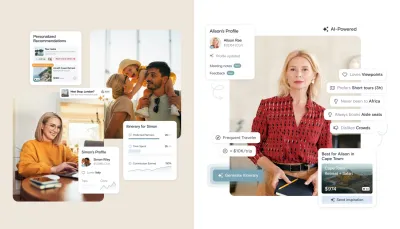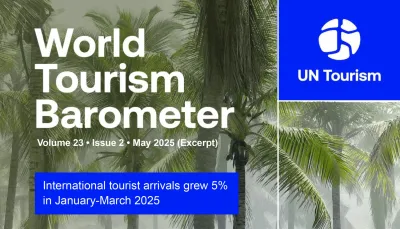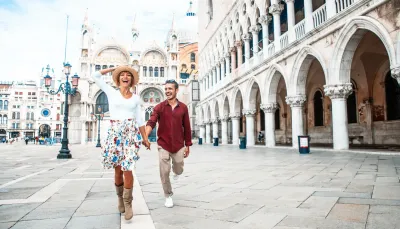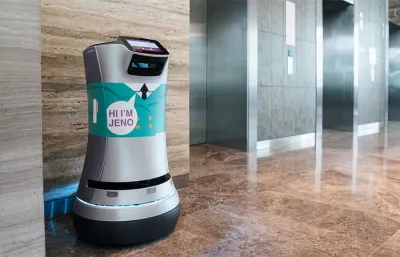AI in hotel distribution 2025
Open innovation in hospitality
Future of hotel guest experience
Hospitality tech strategy Brazil
Paulo Salvador: From Hospitality’s Frontlines to Shaping Its Future
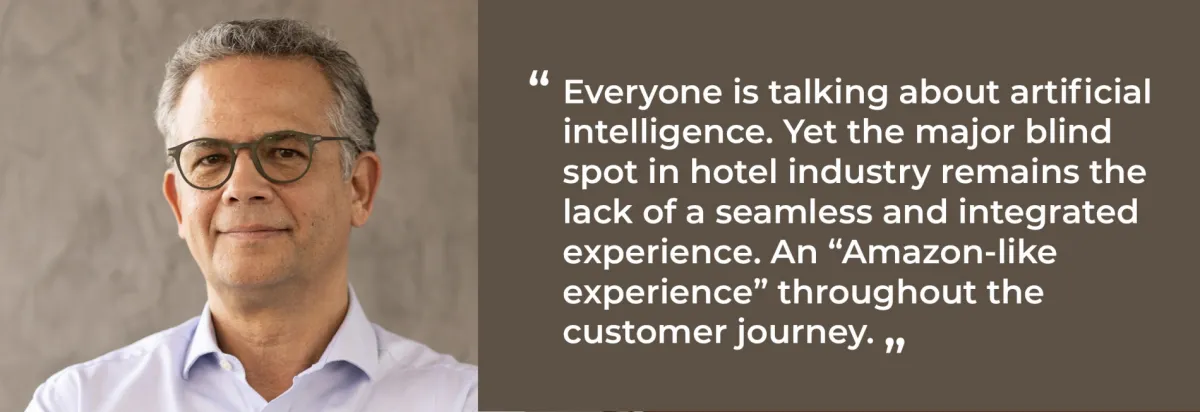
AI in hotel distribution 2025
Open innovation in hospitality
Future of hotel guest experience
Hospitality tech strategy Brazil
Some people talk about industry transformation. Others make it happen — with both feet on the ground and eyes set firmly on the horizon. Paulo Salvador is the latter.
With over 25 years of hands-on leadership at global hospitality giants like AccorHotels, Worldhotels, and Omnibees, Paulo has shaped key areas of marketing, sales, distribution and loyalty. He is the creator of Accor’s groundbreaking loyalty program, ALL (Accor Live Limitless), which today boasts over 100 million members worldwide. In Brazil, he introduced the innovative hotel modular construction firm Modularis Offsite Building.
Yet what truly sets him apart isn’t just his impressive track record - it's how he translates deep operational experience into strategic innovation, always anchored in human insights.
As Partner for Technology & Innovation practices at Noctua Advisory a leading Brazilian advisory firm, Paulo works alongside hotel and real estate companies to reinvent business models, launch new ventures, optimize asset portfolios, and roll out cutting-edge revenue management systems. For Paulo, innovation isn’t just about technology—it's about “aligning strategy, operations, and organizational culture as a systemic view”. Whether guiding executives, mentoring founders, or advising investors, Paulo consistently connects people, ideas, and opportunities in pragmatic and meaningful ways.
He is also a Business Partner at BAE Ventures, where he brings this systemic approach to the startup ecosystem — helping companies in travel and hospitality rethink business models, unlock growth opportunities, and align strategy with operational execution.
His impact also extends powerfully into academia. At ESSEC Business School in Paris, he teaches Managerial Innovation in the prestigious MSc in Hospitality Management (IMHI), preparing the next generation of hospitality leaders to navigate change with agility, thoughtfulness, and creativity. Paulo holds a Master’s in Corporate Sociology from Sciences Po Paris and is certified executive coach from the Parisian School Transformance Pro, bringing a humanistic perspective to his projects.
So we sat down with Paulo to ask the hard questions—the ones keeping hospitality leaders up at night. From blind spots in guest experience to the real role of AI agents in distribution, here’s what he had to say.
1. What’s the next major blind spot in hospitality strategy — the thing no one is seeing yet, but that will soon redefine competitive advantage?
Everyone is talking about artificial intelligence and its impact on the hotel business. Yet the major blind spot in our industry remains the lack of a seamless, integrated experience. Our sector struggles to deliver an “Amazon-like experience” throughout the customer journey. Every step of a hotel stay is disconnected: distribution is not linked to the front office for personalized, frictionless check-in; the front office is not connected to housekeeping; and neither is connected to food and beverage or other departments. As a result, the guest experience stays fragmented rather than truly unified.
The “santo graal” of our industry is to move beyond siloed systems and embrace end-to-end technology that unifies every step of the guest journey. And AI surely will be a facilitator.
2. You’ve worked across boardrooms, startups, and classrooms. In a world where everyone claims to embrace Open Innovation — where is it genuinely creating value, and where is it still just theatre?
Its not a theatre. Open Innovation is valuable to every business. However, before we give two step forwards with Open Innovation in Hotels we need to give one step back and demystify the term innovation.
When I ask students and General Managers what innovation really means and how to apply, I get different -often vague- answers focused on “applying technology to solve a given problem”.
For me, Innovation is a systemic vision based in three pillars:
- First, it should be an ordinary part of daily operations, not something imposed by rules or outsiders. It needs to become a natural, almost imperceptible routine—where everyone asks, “How can we improve efficiency, outperform competitors, and solve customer problems?”
- Second, innovation must be a movement—a dynamic trajectory that takes an idea from point A to point B. Measurable actions and KPIs along this journey create engagement and ownership. As I once heard in a hotel team discussion: “If it’s not my cause, I can’t engage.”
- Finally, this systemic mindset must be supported by a management that believes the best solutions come from both inside and outside the organization. That’s where Open Innovation truly brings value, enabling and connecting a hole ecosystem of partnerships, hackathons, startups and capital access to speed up things.
3. If you were building a hospitality group from scratch today, what three capabilities would you make non-negotiable from day one?
If I had the opportunity to lead the creation of a hospitality group, I would follow the same path that Michael Levy took when he created CitizenM: starting from a blank page and bringing together a group of smart people from diverse backgrounds and ages. Together, we would design from scratch the three most important elements for a successful operation: How to build optimized spaces through design and sustainability? How to empower employees? And finally, how to embrace data, data and data throughout the entire journey of customers, employees and the building/spaces.
4. How do we keep the ‘human’ in hospitality when data, automation, and AI are reshaping every guest touchpoint?
In our industry we have the common mistake of throwing people to solve problems and processes. Humans should be kept to interact with guests not to deal with repetitive tasks. Artificial Intelligence is ending with human repetitive tasks and allowing managers to allocate people to smile, observe and interact with guests. A new era is expected in services with the rise of AI
5. How can hotel groups strategically position themselves in a distribution landscape increasingly driven by AI and proprietary platforms?
Large hotel chains have strengthened their defenses in the battle over distribution costs in recent years by leveraging two major fronts: first, empowering loyalty program benefits to drive members to book directly.
Secondly, merging or acquiring smaller chains to gain negotiating power and lower commissions with OTAs and brokers.
This has worked pretty well: now a days loyalty members represent in average 80% of the website reservations. Additionally, a hotel belonging to a chain now pays lower commissions than an independent property.
The next frontier is starting to happen now, as generative AI topic switches to agents. AI agents are set to become the most disruptive force in distribution, serving as the transactional core of the booking journey.
Only the large groups will be able to fully capitalize on this trend.
Let me explain. Now a day when we look for a hotel, we throw our parameters in Google. With an AI agent we can run a single prompt mentioning loyalty number, preferences, budget, breakfast options whatever come to our head. Going as granular as possible. Agents will deliver hundreds of options or a curated selection, complete with images for each product, and may even negotiate on our behalf.
Behind this revolution is API connectivity: AI agents will rely on APIs to access and process information. Only the big chains and it´s proprietary platforms will be able to provide content in such granularity to enhance direct reservations. The other day I said in a conference that websites are dead because, as far as the AI agent is concerned, a website is an API itself. That´s a breakthrough moment for hotel distribution.
At BAE Ventures, we believe genuine innovation emerges from deep expertise combined with the courage to challenge established norms. Having a visionary leader like Paulo Salvador in our ecosystem isn’t just a privilege - it’s a catalyst for meaningful change. Because when the future of hospitality is on the line, we’d rather have someone who’s been in the arena — not just reading the playbook. Paulo Salvador doesn’t just understand where the industry is going — he’s already building the road to get there.
